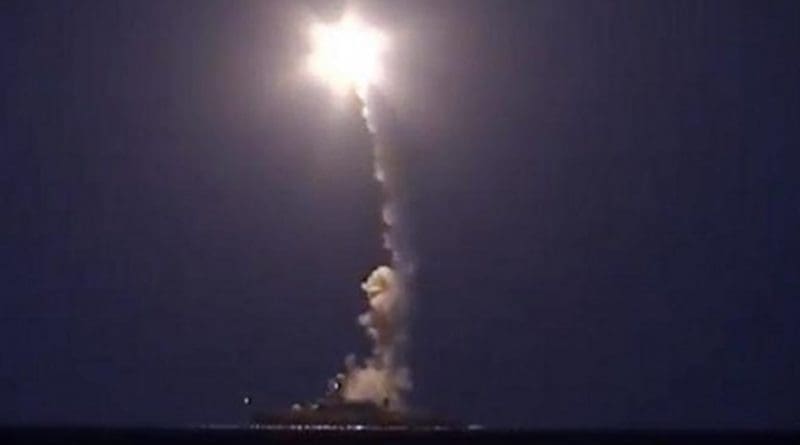Russia’s Military Intervention In Syria Signals Russian Strategic Resurgence – Analysis
By Dr. Subhash Kapila and SAAG
By Dr Subhash Kapila*
Russia’s military intervention in Syria in recent weeks could possibly be read as Russia’s strategic resurgence, more than Crimea and Eastern Ukraine, which in any case were Russia’s Near Abroad and within easy reach of the Russian military.
Russian Foreign Minister Lavrov justified the Russian military intervention in Syria firstly, as an imperative to safeguard Russia’s national security interests of neutralising or liquidating the ISIS Islamist threat before it touches Homeland Russia. The Russian Foreign Minister stated that the Russian military intervention in Syria was not personality-specific in terms of sustaining the Assad regime in Damascus.
The second reason advanced by the Russian Foreign Minister was that Russian military intervention was undertaken on the specific request of a friendly Government of Syria.
Be as it may, the strategic reality is that Russia has clearly signalled that it has the military capability for conducting military intervention operations in distant areas by a combination of use of Russian Air Force strikes and logistics support and Russian Navy operations in distant seas. Though Russia has only flown in about 2,000 Russian Army contingents, it has further signalled that it is willing to put ‘boots on the ground’ and more f required.
The Russian military intervention in Syria has also enabled Russia to demonstrate the effectiveness of latest Russian military hardware, especially its Air Force assets. Russia used to effect at least three latest versions of Sukhoi combat aircraft. Russia also demonstrated the devastating use of its Cruise Missiles fired from a distance of 900 kilometres from Caspian Sea fleet.
Notably, the Russian military intervention in Syria stands supplemented and reinforced by Iranian military participation, besides the Lebanese Hezbollah.
In terms of tangible results on the ground in Syria, media reports indicate that the Syrian Army so stiffened has made considerable headway in wresting areas won over by the Free Syrian Army operating under US CIA and Saudi Arabian assistance.
Russian airstrikes on ISIS concentrations are reported to have seriously hit 34 of the 37 major ISIS concentrations. Video footage on Internet show significant damage. As indicated in my last Paper, Russian air strikes have incorporated air strikes on Free Syrian Army targets also while hitting ISIS targets. This has drawn strong criticism from the United States, as was expected.
United States and Western nations are in no position to directly intervene against the Russian military intervention. With the United States now engrossed in presidential elections campaigning, no space exists for President Obama to undertake any strong ripostes against the Russian military intervention.
China has come out openly in support of the Russian military intervention in Syria, presumably as a riposte against United States pressures on the South China Sea conflicts and US threats to sail US Naval Task Forces waters in close vicinity of the newly constructed artificial islands in the South China Sea.
More significantly, what is noticeable is Pakistan’s open public support for the Russian military intervention in Syria mouthed by the Pakistani Defence Minister. It is keeping in tune with changing times in Pakistan’s foreign policy of distancing itself from United States and Saudi Arabia and cosying upto Russia. Presumably, Pakistan would expect Russia to register Pakistan’s support and cash its ‘rain-check’ against India at a later date, hopefully.
Stray reports also indicate that Israel too may have been supportive of Russian military intervention in Syria, presumably, because of the ISIS context.
Concluding, it can be asserted that Russia would react strongly against any efforts to undermine the Pro-Russia configuration of the Northern Tier of the Middle East. Surely, the Russian military intervention in Syria has the potential to change the dynamics of Middle East power-play especially between Iran and Saudi Arabia.
*Dr Subhash Kapila is a graduate of the Royal British Army Staff College, Camberley and combines a rich experience of Indian Army, Cabinet Secretariat, and diplomatic assignments in Bhutan, Japan, South Korea and USA. Currently, Consultant International Relations & Strategic Affairs with South Asia Analysis Group. He can be reached at [email protected]

